Archived Fire Damage Blog Posts
Christmas Safety Tips for SERVPRO of Sandy in Sandy, UT
11/23/2024 (Permalink)
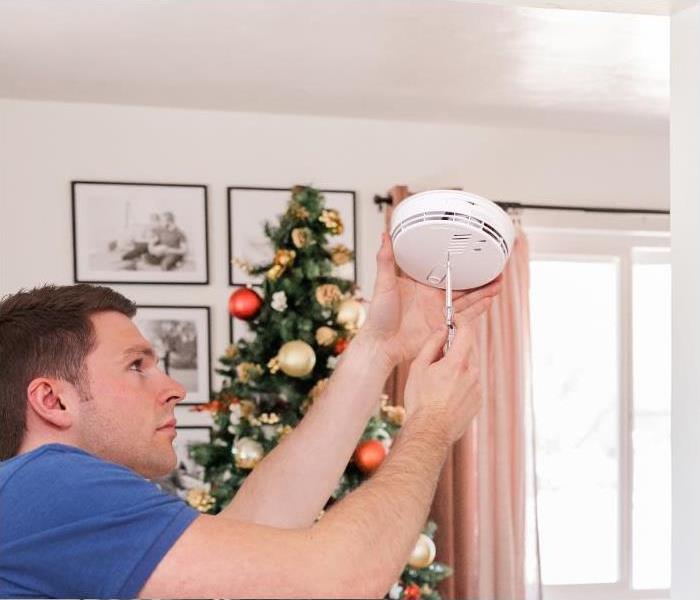 Christmas Safety in Sandy, UT.
Christmas Safety in Sandy, UT.
As the holiday season approaches, Sandy, UT, is buzzing with excitement. From festive decorations to family gatherings, Christmas brings joy, but it also presents potential safety hazards. The season of giving and celebration is not without its risks, such as fire hazards, water damage, and accidents that can occur when homes are filled with decorations, cooking, and visitors. At SERVPRO® of Sandy, we want to make sure you have a safe and happy holiday season. Here are some Christmas safety tips to keep in mind to protect your home and loved ones.
1. Fire Safety with Christmas Decorations
Christmas decorations are a beautiful way to bring the spirit of the season into your home, but they can also be fire hazards if not used properly. Christmas trees, lights, and candles all contribute to the seasonal ambiance, but they also need to be handled with care.
Tips for Fire Safety:
Choose a Fresh Tree: If you opt for a real tree, ensure it is fresh. Fresh trees are less likely to catch fire than dry ones. Check for a tree with vibrant green needles and a sticky trunk.
Keep Trees Watered: A dry tree is a major fire risk. Make sure to water your tree daily to prevent it from drying out.
Properly Dispose of Your Tree: After Christmas, get rid of your tree immediately. Do not leave it inside your home as it will dry out over time and become a fire hazard.
Inspect Lights: Before hanging lights, inspect them for any frayed wires or broken bulbs. Replace damaged lights to prevent electrical fires.
Turn Off Lights: Always turn off Christmas tree lights when going to bed or leaving the house. A simple oversight can lead to a dangerous fire.
Avoid Overloading Circuits: Overloading electrical circuits with too many lights or decorations can trigger fires. Plug lights into properly rated extension cords and outlets.
2. Safe Cooking Practices
Holiday meals are a tradition in many homes, but cooking during Christmas can be risky. With the increased use of stoves, ovens, and deep fryers, the potential for kitchen fires rises.
Cooking Safety Tips:
Stay in the Kitchen: Never leave the stove or oven unattended while cooking. If you must leave, ask someone to watch your cooking.
Use a Timer: For dishes that require long cooking times, set a timer as a reminder to check the food periodically.
Keep Flammable Items Away: Keep towels, oven mitts, paper towels, and other flammable materials away from hot cooking surfaces.
Don’t Overfill Fryers: When using a deep fryer, never overfill it with oil, as this can lead to dangerous spills and fires. Always follow the manufacturer's instructions.
Check Appliances for Damage: Before using kitchen appliances, inspect them for damage, and ensure they are clean. A dirty oven or stovetop can increase the risk of fires.
3. Preventing Water Damage
Christmas celebrations often involve using additional decorations like artificial snow, as well as hosting family members who may bring in the elements of winter from outside. If proper precautions are not taken, water damage can occur.
Water Damage Prevention Tips:
Check Roof for Leaks: The cold, snowy winters in Sandy, UT, can lead to ice dams and leaks in your roof. Before the snow starts falling, inspect your roof for any existing issues, and address them before they become bigger problems.
Inspect Pipes: Frozen pipes can burst when the temperatures drop, leading to water damage in your home. Before the cold weather sets in, ensure that pipes are insulated, especially in unheated areas like attics and crawl spaces.
Use a Dehumidifier: Humidity levels tend to rise in winter due to activities like cooking, showering, and holiday décor. Use a dehumidifier in areas that are more prone to moisture accumulation to prevent mold and water damage.
Check Your Sump Pump: If you have a basement, check your sump pump to ensure it is working properly before the winter season. A malfunctioning sump pump can result in flooding during heavy winter rains or melting snow.
4. Carbon Monoxide Safety
With the cold temperatures in Sandy, many people use their fireplaces, space heaters, or furnaces to stay warm. While these can be great for heating your home, they can also pose a risk of carbon monoxide poisoning if not properly maintained.
Carbon Monoxide Safety Tips:
Install Carbon Monoxide Detectors: Ensure that carbon monoxide detectors are installed in key areas, including near sleeping areas and in hallways. Test them regularly and replace batteries as needed.
Maintain Heaters and Chimneys: Have your heating systems and chimney professionally cleaned and inspected each year to ensure they are functioning properly.
Ventilate Properly: If you use space heaters, make sure they are placed in well-ventilated areas, and always turn them off when you leave the room or go to bed.
5. Preventing Slips and Falls
Winter weather in Sandy can be unpredictable, and it often brings snow and ice. These conditions can make walking outside dangerous, increasing the risk of slips and falls.
Slips and Falls Prevention Tips:
Clear Walkways: Keep your driveway, walkway, and entryways clear of snow and ice. Use salt or sand to improve traction.
Install Handrails: If you have stairs outside, ensure they have sturdy handrails to provide support for those who may need it.
Wear Proper Footwear: Make sure that everyone in your household wears shoes with good traction when going outside during winter weather.
Use a Sturdy Ladder: When decorating your home for the holidays, use a sturdy, properly positioned ladder. Never stand on a chair or table to hang decorations, as it increases the risk of falling.
6. Pet Safety
If you have pets, Christmas can be a stressful time for them. With guests coming and going, changes to their routines, and new decorations in your home, it’s important to ensure your pets are safe and comfortable during the holidays.
Pet Safety Tips:
Keep Toxic Plants Away: Some common holiday plants, such as poinsettias, mistletoe, and holly, can be toxic to pets. Keep these plants out of reach or opt for artificial versions.
Secure Ornaments and Decorations: Pets may be curious about the shiny baubles and ribbons on your tree. Make sure decorations are securely fastened to prevent pets from chewing on them or knocking them over.
Create a Safe Space: If the holiday gatherings are overwhelming for your pets, set up a quiet space with their bed and toys where they can retreat to when they need a break.
7. Holiday Travel Safety
Many people travel during the holiday season, whether it’s to visit family or to get away. While traveling can be fun and exciting, it’s important to take steps to protect your home when you're away.
Travel Safety Tips:
Check Security Systems: Before you leave for vacation, check that your security system is working and that all doors and windows are securely locked.
Set Lights on Timers: To deter burglars, set some lights or electronic devices on timers to give the appearance that someone is home.
Shut Off Water: If you're leaving for an extended period, consider shutting off the water supply to prevent leaks or bursts while you're away.
By following these Christmas safety tips, you can ensure that your holiday season in Sandy, UT, is safe, enjoyable, and free from accidents or damage. At SERVPRO of Sandy, we care about your home and family’s well-being. If you do experience fire, water, or mold damage during the holidays, don’t hesitate to call us for expert restoration services to make your home “Like it never even happened.”
From all of us at SERVPRO of Sandy, we wish you a Merry Christmas and a safe, healthy New Year!
Essential Fire Safety Tips for Residential Homes in Sandy, UT
7/22/2024 (Permalink)
 Key Fire Safety Tips for Homes in Sandy, UT
Key Fire Safety Tips for Homes in Sandy, UT
Fire safety is a critical concern for homeowners everywhere, including those in Sandy, UT. Taking proactive measures to prevent fires and knowing how to react in case of a fire can save lives and property. Here are some comprehensive fire safety tips tailored for residents of Sandy, UT:
1. Install Smoke Alarms
Smoke alarms are your first line of defense against fires. Install smoke alarms on every level of your home, including inside bedrooms and near sleeping areas. Test them monthly and replace batteries at least once a year. Consider upgrading to interconnected alarms so that when one sounds, they all sound.
2. Have a Fire Escape Plan
Create a fire escape plan with your family and practice it regularly. Identify two ways out of every room, especially bedrooms. Designate a meeting place outside the home where everyone will gather after escaping a fire. Ensure that everyone knows how to call 911 or the local emergency number.
3. Install Carbon Monoxide Detectors
Carbon monoxide (CO) is an odorless, colorless gas that can be deadly. Install CO detectors near sleeping areas and on every level of your home, especially near fuel-burning appliances. Test them monthly and replace batteries as needed.
4. Maintain Heating Equipment
Ensure that all heating equipment, including furnaces, chimneys, and space heaters, are professionally inspected and maintained annually. Keep flammable materials, such as curtains and furniture, away from heat sources.
5. Practice Safe Cooking Habits
Cooking is a leading cause of home fires. Never leave cooking food unattended, especially when frying or broiling. Keep flammable items away from the stove, and ensure that pot handles are turned inward to prevent accidental spills.
6. Use Electrical Appliances Safely
Inspect electrical cords for damage or fraying, and replace any that are worn out. Avoid overloading outlets or using extension cords as permanent wiring. Unplug small appliances when not in use and teach children not to play with electrical cords or outlets.
7. Store Flammable Materials Properly
Keep flammable liquids, such as gasoline, propane, and paint thinner, in approved containers and store them away from heat sources and living areas. Dispose of oily rags in metal containers with tight-fitting lids.
8. Be Cautious with Candles and Smoking
Keep candles in sturdy holders on a stable surface, away from flammable materials and out of reach of children and pets. Extinguish candles before leaving a room or going to bed. If you smoke, do so outside, and use deep ashtrays filled with sand to extinguish cigarette butts.
9. Maintain a Fire Extinguisher
Keep a fire extinguisher in the kitchen, garage, and any other areas prone to fires. Learn how to use it properly and ensure it is regularly inspected and recharged by a professional.
10. Secure Your Home Against Wildfires
Living in Sandy, UT, means being prepared for potential wildfires. Create defensible space around your home by clearing debris and vegetation. Use fire-resistant materials for roofing and siding. Have an evacuation plan in place in case of a wildfire threat.
11. Educate Your Family
Educate everyone in your household about fire safety practices. Teach children to recognize the sound of smoke alarms and what to do if they hear one. Discuss the importance of fire safety and regularly review your family's fire escape plan.
12. Consider Home Security Systems
Some home security systems offer fire detection capabilities. Consider installing one that can alert emergency services in case of a fire, even when you're not home.
By implementing these fire safety tips tailored for residential homes in Sandy, UT, you can significantly reduce the risk of fire and protect your loved ones and property. Remember, fire prevention starts with awareness, preparation, and vigilance. Take the necessary steps today to ensure a safer tomorrow for your home and family.
Cooking Up Safety: Protecting Your Kitchen from Fires and Restoring Your Home with SERVPRO of Sandy
10/19/2023 (Permalink)
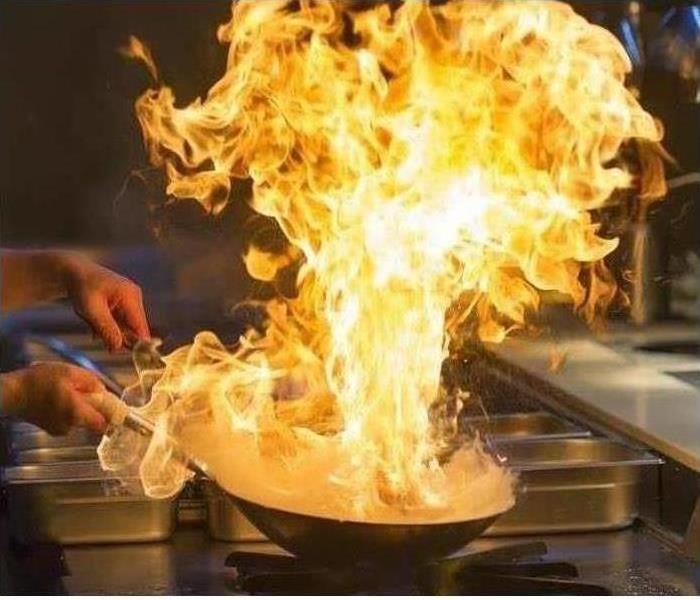 Kitchen fires can be devastating to your Sandy, UT, home.
Kitchen fires can be devastating to your Sandy, UT, home.
The kitchen, often dubbed the heart of the home, is a place where we create culinary masterpieces, bond with family, and make cherished memories. But it's also a potential hotbed for fires. Ensuring your kitchen is safe from fires is not only a matter of personal safety but also one of safeguarding your most treasured space. In this comprehensive blog post, we'll delve deep into the topic of kitchen fire prevention and introduce you to the indispensable services offered by SERVPRO of Sandy when disaster strikes.
Fire Prevention in the Kitchen
The Leading Causes of Kitchen Fires
Unattended Cooking: Among the most common causes, unattended cooking tops the list. Leaving your stove or oven unattended is a recipe for disaster.
Grease Fires: The combination of oil, high heat, and an open flame can quickly escalate into a dangerous grease fire.
Electrical Failures: Faulty wiring, worn-out appliances, or misuse of kitchen electricals can spark electrical fires.
Cluttered Workspaces: Piles of paper towels, dishtowels, and clutter near the stovetop or oven can easily ignite.
Preventive Measures for a Fire-Safe Kitchen
Never Leave the Stove Unattended: Commit to staying in the kitchen while cooking, or have someone responsible take your place.
Keep Flammables at Bay: Store dishcloths, potholders, and paper towels away from the stove and other heat sources.
Regular Appliance Maintenance: Ensure your kitchen appliances are in top-notch condition. Faulty wiring or malfunctioning appliances can trigger fires.
Smoke Detectors: Equip your home, particularly the kitchen, with working smoke detectors, and test them regularly.
Fire Extinguishers - Your Kitchen's Firefighter
In any firefighting effort, a fire extinguisher is your first line of defense. Having one at your fingertips can make all the difference in containing a fire before it grows out of control. Here are some key points to consider:
Choosing the Right Extinguisher: Different types of fire extinguishers are designed to combat different classes of fires. Familiarize yourself with the types and have the appropriate one for your kitchen.
Proper Usage: Owning a fire extinguisher is not enough; you must know how to use it. Train yourself and family members on its operation.
SERVPRO of Sandy - Your Restoration Partner
Sometimes, despite your best efforts, fires do occur. In such trying moments, SERVPRO of Sandy is your trusted partner in restoring your home. Here's how they can assist:
24/7 Emergency Response:
Fires can strike at any hour. SERVPRO of Sandy understands this and offers 24/7 emergency response. Their swift action helps minimize the damage.
Assessment and Cleanup:
Post-fire, your home may be left in shambles. SERVPRO professionals assess the situation, remove debris, and meticulously clean the affected areas to prepare for restoration.
Odor Removal:
Smoke and fire residues leave behind stubborn, unpleasant odors. SERVPRO employs advanced techniques to eliminate these odors, leaving your home smelling fresh once again.
Restoration and Reconstruction:
SERVPRO of Sandy doesn't stop at cleanup. They specialize in restoration and reconstruction, restoring your home to its pre-fire condition. From repairing damaged walls to replacing flooring and fixtures, they ensure your kitchen and the rest of your home looks as good as new.
In conclusion, preventing kitchen fires in your Sandy, UT, home is of paramount importance. It's a testament to your commitment to safety, not just for yourself but for your family and your home. Staying vigilant, maintaining your kitchen appliances, and having the right safety equipment on hand are fundamental steps in minimizing the risk of kitchen fires.
Should the unexpected occur, however, rest assured that SERVPRO of Sandy is here to help you recover and rebuild. Your kitchen will once again become the place of joy, warmth, and cherished memories that it should be.
Remember, fire safety in the kitchen is not just about preventing fires but also being prepared for their aftermath. A well-protected and restored kitchen is not just a source of sustenance but a source of comfort and happiness in your home. Stay safe and enjoy your culinary adventures in a secure and welcoming environment.
How To Protect Your Home After Fire Damage
9/13/2023 (Permalink)
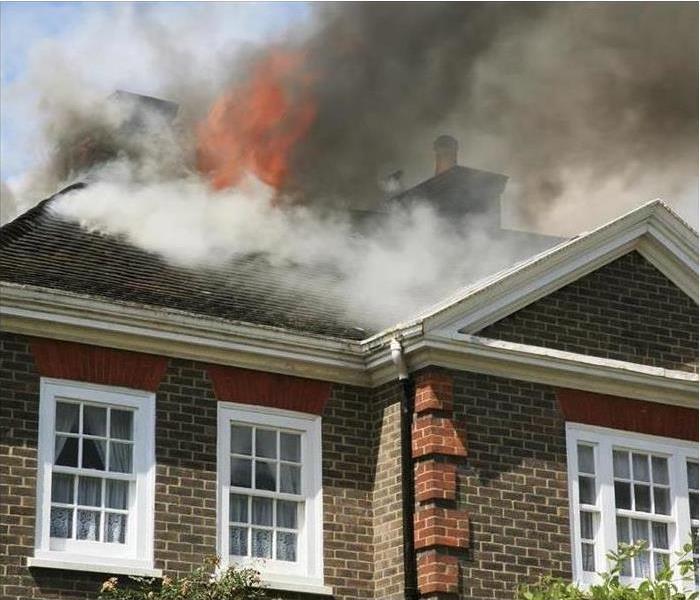 Fire damage in Sandy, UT.
Fire damage in Sandy, UT.
Whether you are waiting on the insurance company or the contractor, it can take a while for repairs to be completed on a fire-damaged home. Protective steps, such as board up service, can prevent additional damage from occurring to your home while you wait.
Emergency Board Up Service
If your home has extensive fire damage, you may be tempted to think it couldn't possibly get any worse. However bad the damage may seem, there are several reasons you should protect your property:
- Theft or Vandalism
Vacant homes are attractive targets for thieves and vandals because the risk of being caught is lower. Burned homes may contain valuable property that thieves may steal if your home is not properly protected.
- Insurance Requirements
Most insurance policies require homeowners to take reasonable steps to prevent additional damage from occurring to their homes. Failing to take these steps may result in additional damage not being covered by your insurance. Fortunately, most insurance covers the cost of these protective measures.
- Liability
If you don't secure your damaged home and someone goes inside and gets hurt, you may be liable for that person's injuries. However, you should not enter an unsafe building yourself. You may need to contact a professional restoration service in Sandy, UT, to safely secure your property.
- Weather and Animals
Holes in the roof and walls of your home provide entry points for wind, water and animals. Covering up these openings prevents additional damage from occurring because of a storm or animal infestation.
What Is Board Up Service?
The heat from a fire can cause windows to break. Additionally, windows are often targets for vandals or thieves. Windows can be secured by covering the openings with plywood and securing them with bolts attached to the interior walls. Plywood may also be used to cover sections of the exterior walls or roof that have holes.
What Is Tarping?
Tarps may be used to cover damaged portions of your roof to prevent rain from entering your home. Because working on a fire-damaged roof can be dangerous, it is a good idea to contact a professional to provide this service.
What Other Steps Should I Take?
The water used to put out fires can cause additional damage if steps are not taken to dry out your home as soon as possible. Do not attempt to enter your home until the fire department says it is safe. Once you can go inside, start removing wet items. Consider contacting a restoration service to assist with drying out your home.
Do not attempt to move back into your home until all of the fire and smoke damage has been cleaned up. If you have insurance, your insurance policy may pay for you to temporarily live somewhere else, such as a hotel room or a rental, while your home is being cleaned and repaired.
Protective steps, such as board up service, can prevent additional damage to your home. Your insurance professional or local fire department can assist you if you are unsure which steps to take to secure your property.
How Do You Make a Fire Restoration Claim?
2/23/2022 (Permalink)
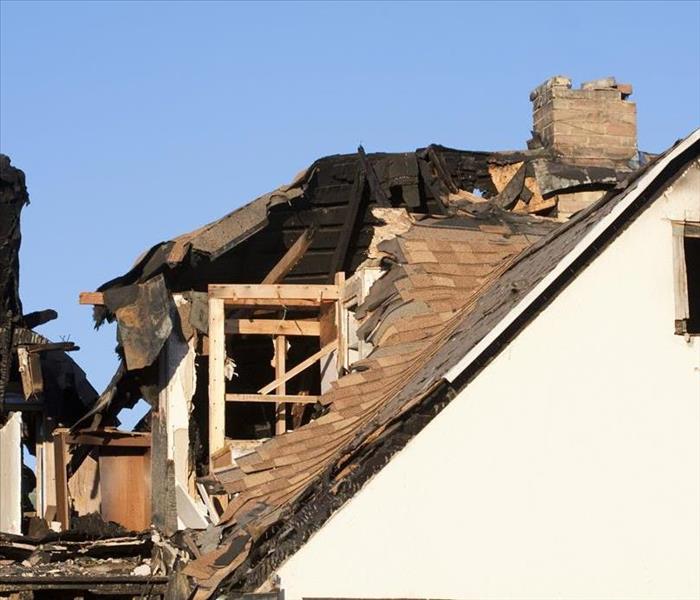 Follow These Tips to Make a Fire Restoration Claim properly. If you have questions, just call us.
Follow These Tips to Make a Fire Restoration Claim properly. If you have questions, just call us.
When you experience a fire, the only thing on your mind after survival is fire restoration. The thought of being able to walk back in your front door and have your home back is encouraging, and it is a thought that can seem so far from reality, which is why you hire a remediation specialist in Sandy, UT, to help you realize the vision. The specialist will go through a series of steps, including:
- Water removal
- Debris removal
- Smoke cleaning
- Repair and restoration
However, before a restoration can begin working on your home, a company needs some form of payment. The best way to pay for a restoration is by filing an insurance claim and taking advantage of your coverage.
Fire Restoration and Insurance Claims
Filing a fire insurance claim can seem overwhelming. It is a lengthy, somewhat lengthy process and so much depends on a claim's approval. Thankfully, a restoration company can help you with the claims process. Many companies even act as a sort of intermediary between the client and the insurer. However, it is still beneficial to understand the necessary steps you must take to help the claims process along.
1. Call Your Insurer
Before you consider fire or smoke cleaning, it is necessary to call your insurance provider. Making that one phone call is the initiation of the claims process. Reporting the disaster is also when you schedule an insurance assessment. Unfortunately, insurance adjusters are often backlogged, so the adjuster can take a few days or more to arrive on location. Thankfully, you do not have to wait to call a restoration service. As soon as you report the disaster, you can call a service to come and assess the damage.
2. Mitigate Further Loss
Most insurance companies will require homeowners to take action against further loss, meaning you will need to mitigate potential damage. A restoration company can help you because most offer mitigation services. Fires can lead to extensive structural damage, such as holes in the roof or walls. Restoration companies will typically offer board-up, tarping, and fencing services to help protect your property and your claim.
3. Take a Loss Inventory
When the property is safe to walk through, you can help move the claims process along by preparing for your meeting with the adjuster. A loss inventory is a collection of photographs and receipts to help the adjuster assess your losses. Usually, you will take pictures of damaged items and collect receipts into a lass statement.
4. Wait for Insurance Adjuster
The last thing you need to do is wait for the insurance adjuster. Most adjusters will try to prioritize disaster claims so that an adjuster will show up within a few days in many instances. However, the timeline does depend on the adjuster and their schedule. A fire restoration often depends on the claims process. Unfortunately, the claims process takes time, and it can feel overwhelming.
Thankfully, restoration companies can often help streamline the process by communicating with the insurance company on behalf of the client, making the process easier to comprehend and manage.
Reasons To Assess Electronics After a Fire
2/11/2022 (Permalink)
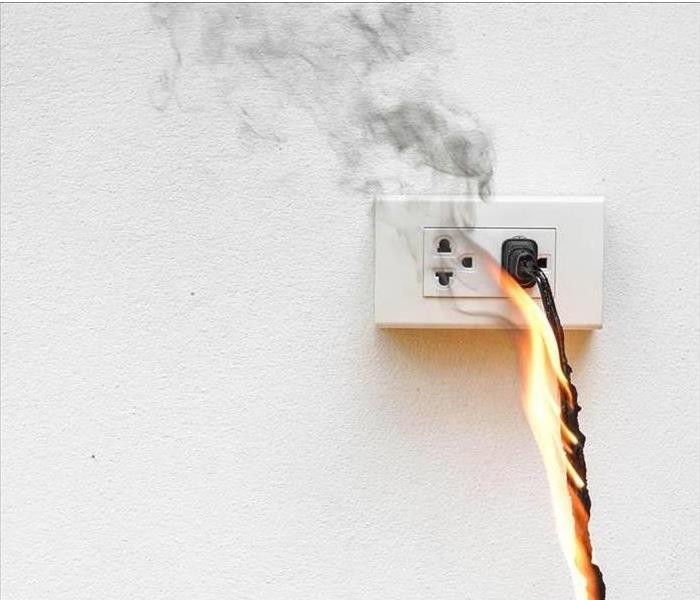 A fire can cause damage to your electronics. Assessing the electronics is an important step of the fire cleanup process.
A fire can cause damage to your electronics. Assessing the electronics is an important step of the fire cleanup process.
There are many ways that a fire can damage your home in Sandy, UT. Fire cleanup must happen in a timely manner, and it often involves both water damage and smoke damage mitigation. Some items, such as electronics, may not look like they are damaged, but the only way to tell for sure is to have them inspected by certified professionals. This assessment helps to identify the type of damage, whether it can be fixed and the steps needed to do so.
3 Reasons to Assess Your Electronics After a Fire
1. Type of Damage
You can't always tell if your electronics have smoke damage just by looking at them. Even if your computer, television and gaming system will turn on after a fire, that doesn't mean they're safe to use. Many things could be causing damage under the surface:
- Smoke particles
- Soot deposits
- Melted components
- Water damage
If smoke got inside the machine, it can leave a film behind that insulates the interior parts, causing them to overheat when it is used. Soot is highly acidic and thus can cause sensitive circuits to deteriorate. Without the aid of smoke restoration experts who can not only identify but also fix the problems, it is not a good idea to plug in your electronics or use them once they've been exposed to smoke.
2. Cleanup Process
It's important to get professional assistance when it comes to fire cleanup. Before technicians arrive, however, there may be some things you can do to stop or slow the damage that is happening. Wipe the outside surfaces down with a clean cloth to remove as much of the soot as possible. Remove the hard drive and the battery if it is safe to do so. This minimizes the risk of data loss or additional acid leaks.
The technicians start by inspecting the components of your equipment. They look for irreparable damage and assess whether the parts that cannot be cleaned can be replaced. Information retrieval often happens during this process unless the hard drive is so fried that everything is lost. As an added safety measure, the battery is likely to be replaced.
3. Loss Prevention
In the event of a fire, there is no guarantee that your electronics are not going to be damaged beyond repair. Any data saved on them may be lost, particularly if they are in the same room where the fire occurs. It's always a good practice to safeguard yourself from vast financial and information losses, even if the equipment used is lost.
Any expensive electronic item should always be insured through your homeowner's policy, the manufacturer's protection plan or both. It's also important to back up the information stored on your home computer, tablets and other devices on a regular basis. Invest in enough cloud storage for the whole family so that you don't lose any data even if the device gets ruined in the fire.
There are many steps to the fire cleanup process, and making sure that everything you bring back into your house when remediation is finished is ready to use again is a big part of it. This is especially important when it comes to your electronics. Wait until the technicians tell you they're safe to use before you turn them back on.




 24/7 Emergency Service
24/7 Emergency Service





